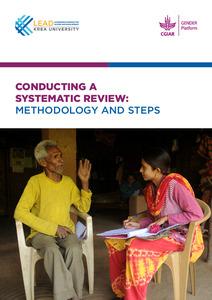Conducting a systematic review: Methodology and steps
Abstract
Systematic reviews have gained momentum as a key method of evidence synthesis in global development research in recent times. As defined in the Cochrane Handbook on Systematic reviews “Systematic reviews seek to collate evidence that fits pre-specified eligibility criteria in order to answer a specific research question. They aim to minimize bias by using explicit, systematic methods documented in advance with a protocol.” It is important to highlight that a systematic review is different from a literature review. While a literature review qualitatively summarises evidence with no specific protocol or search criteria, a systematic review is based on a clearly formulated question, identifies relevant studies, appraises their quality and summarizes the evidence by use of a selected explicit methodology. It is this explicit and systematic approach that distinguishes systematic reviews from traditional reviews and commentaries. It is also important to distinguish between a systematic review and a meta-analysis. While a systematic review refers to the entire process of selection, evaluation and synthesis of evidence; meta-analysis is a specialised sub-set of systematic review.3 Meta-analysis refers to the statistical approach of combining data derived from systematic review. It uses statistical techniques to combine the data examined from individual research studies and uses the pooled data to come to new statistical conclusions. Hence not all systematic reviews will include a meta-analysis, but a meta- analysis is necessarily in a systematic review. The main purpose of this document is to provide guidelines, recommendations and propose a methodology for conducting mixed- method systematic reviews for evidence synthesis for “gender in agriculture and food systems” for the CGIAR GENDER Platform. In this document we highlight some of the good practices from leading organisations who have contributed to the development of methodology for Systematic Reviews over the years. Throughout the document, we refer to relevant guidelines recommended by these organisations for conducting systematic reviews and adapt it to the proposed questions that include synthesis of qualitative, quantitative and mixed-method evidence.

